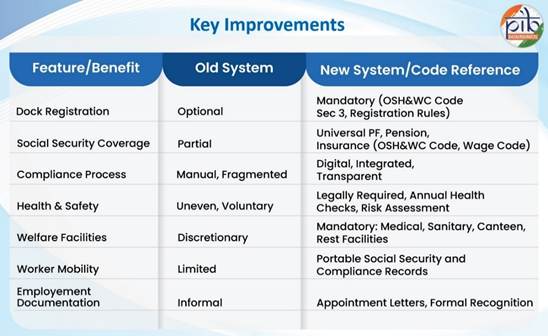PIB Headquarters
Labour Codes Benefit the Dock Workers
Posted On:
28 NOV 2025 1:17PM by PIB Delhi
Key Takeaways
- Compulsory registration of docks as establishments and official recognition of the dock, enabling workers to access legal rights.
- Universal coverage under provident fund, pension, and insurance schemes for all dock workers, including contract and temporary staff.
- The new Labour Codes and maritime legislation have introduced transformative benefits for the safety, health, and welfare of dock workers.
- Enhanced Social Security and Employment Rights to Dock Workers
|
A New Era of Labour Reform in Maritime Workplaces

Labour is a key driver of economic growth and development. In order to simplify and strengthen the framework governing workers’ rights, the Government consolidated 29 labour laws into four comprehensive Labour Codes- namely, the Code on Wages, 2019, the Industrial Relations Code, 2020, the Code on Social Security, 2020 and the Occupational Safety, Health and Working Conditions Code, 2020. This historic reform ensures that workers gain easier access to security, dignity, health, and welfare measures, reinforcing India’s commitment to a fair and future-ready labour ecosystem.
The recent enactment of India’s four Labour Codes, along with updates to maritime legislation such as the Indian Ports Act and the Merchant Shipping Act, has introduced transformative benefits for dock workers. These reforms address long-standing gaps in protection, welfare, and regulation that existed under the previous fragmented system.
Benefits to Dock Workers
The codification aims to enhance ease of doing business, promote employment generation, ensure safety, health, social & wage security for every worker. The benefits to Dock Workers under the Labour Codes are as follows:
Mandatory Dock Registration and Legal Recognition
Historically, many docks operated without formal registration, limiting regulatory oversight and denying workers basic legal protections. Under the new regime:
- Compulsory registration of docks as establishments is now enforced.
- This ensures official recognition of the dock, enabling workers to access legal rights, claim entitlements, and seek redress.
- Establishments must maintain records and comply with mandated safety, health, and welfare standards, enhancing accountability.
Enhanced Social Security and Employment Rights
Dock workers, especially those employed casually or indirectly, were previously excluded from social security benefits. Key improvements include:
- Universal coverage under provident fund, pension, and insurance schemes for all dock workers, including contract and temporary staff.
- Mandatory appointment letters and formal recognition of service, ensuring inclusion in social security databases.
- These provisions remove historic exclusions and provide a secure financial safety net.
Modernized Operational Processes
The Codes introduce digital platforms for dock registration, compliance, and benefit delivery:
- Online registration, documentation, and reporting improve transparency and reduce delays.
- E-governance for wages, complaints, and benefits ensures efficiency and minimizes disputes.
- Interstate and cross-regional portability of social security and compliance records now supports worker mobility.
Safety, Health, and Welfare Reforms
The OSH&WC Code now brings all docks, including temporary or contract workers, under mandatory health, safety, and welfare regulation:
- Annual employer-funded health check-ups improve early detection of occupational health risks.
- Detailed risk assessments and preventive measures address dock-specific hazards, including falls, fire, explosions, noise, and exposure to hazardous substances.
- Mandatory safety equipment such as certified lifting devices, protective gear, and lifesaving appliances are now standard.
- Provision of medical facilities, first aid, sanitary and washing areas, canteens, drinking water, and rest areas are now legal requirements, not discretionary.
Institutional Oversight and Worker Participation
- Occupational Safety Boards at state and national levels provide guidance, inspect docks, and update safety standards with worker and employer representation.
- Regular safety audits, inspections, and accident reporting systems are now mandatory.
- Workers now have a voice in policy formulation and compliance oversight, promoting participatory governance.
International Alignment
These reforms bring Indian dock operations closer to global best practices:
- Alignment with international maritime safety and labour standards.
- Registration of Indian-flagged ships and standardization of compliance enhance worker protection.
- Transparency, accountability, and enforceability of employment and safety measures ensure a modern, equitable working environment.

Towards a Safer and Stronger Dock Workforce
The new Labour Codes and maritime legislation collectively deliver a holistic framework for the safety, health, and welfare of dock workers. By formalizing registration, enhancing social security, modernizing operational processes, instituting rigorous safety standards, and enabling worker participation, these reforms create safer, more equitable, and future-ready dock workplaces, addressing decades of regulatory and welfare gaps.
Click here to see in PDF
M
(Release ID: 2195764)
Visitor Counter : 1189